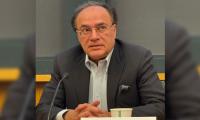The global gap between organ donation and transplant demand is so wide that researchers and surgeons are now seriously turning to genetically engineered animal organs to fill the void, said Dr Mansoor Mohiuddin, Pakistani-American pioneer of the world’s first pig-to-human heart transplant.
Speaking at the inaugural session of the First International Conference on Transplantation (FICT) at the Dow University of Health Sciences on Saturday, Dr. Mohiuddin highlighted the critical organ shortage in countries like Pakistan, where cultural misconceptions and lack of awareness prevent families from donating organs even after brain death.
“We’re experimenting with xenotransplantation—genetically modifying animal organs to match human anatomy—because the supply of human organs is insufficient worldwide,” he said.
He praised recent religious endorsements, including a declaration by Mufti Raghib Naeemi of the Islamic Ideology Council and other scholars, which clarified that organ donation after brain death is permissible under certain conditions, and even animal organs can be used to save lives, irrespective of whether the animal is halal.
“This clarity will undoubtedly help foster a culture of donation and save lives in Pakistan,” he added.
Dr. John Fung, transplant surgeon at the University of Chicago, warned that even when transplants are successful, the biggest threat to survival is not rejection but post-transplant infections. In developed countries, these complications are now increasingly controlled with advanced drugs and medical technology.
However, Fung acknowledged the availability of such drugs in Pakistan remains uncertain and must be addressed urgently. “There is tremendous innovation in post-transplant immunotherapy, but if patients can’t access the required medication, they remain at risk even after surgery,” he said.
Prof. Paulo Grossi from Italy echoed the concern, stating that viral infections are among the deadliest post-transplant complications and require careful, lifelong medical management. Pakistan’s problem, according to experts at the conference, is two-fold: low donor rates due to cultural and systemic barriers, and lack of affordable access to essential immunosuppressants and anti-infective medications.
Prof. Adnan Sharif of the UK pointed out that once patients undergo organ transplantation, their vulnerability to cancer and heart disease rises significantly, largely due to immunosuppressive therapy. “We suppress the immune system to prevent rejection, but that also opens the door to other potentially fatal illnesses,” he explained.
Dr. Asim Ahmed emphasized that Pakistan urgently needs a fair and transparent transplantation framework. “We must eliminate the unethical trade of organs and create a system that protects donors and recipients alike,” he said. He stressed the need for legislative reforms to regulate the emerging field of xenotransplantation and ensure equity and safety in transplant procedures.
The technical sessions also shed light on innovations in live donor procedures. Consultant nephrologist Dr. Ayaz Khan introduced Hand-Assisted Laparoscopic Donor Nephrectomy (HALDN) as a minimally invasive and effective method, particularly for complex kidney structures and pediatric cases.
Another approach, HARS, offers even shorter surgical durations and fewer complications. “Donating a kidney is not just giving an organ—it’s giving life,” Dr. Ayaz said, noting the transformative impact of such procedures.
Dr. Rashid Bin Hamid, Chief Renal Transplant Surgeon at Dow University Hospital, said Pakistan has the potential to become a regional hub of excellence in organ transplantation. “We are working to align our practices with global standards, not just in medical care but in training and research,” he said. “Our vision is to enhance patient quality of life at every stage of transplantation.”
Nephrologist Dr. Tasadduq Khan underlined the ethical urgency behind promoting donations. “A kidney is a gift of life. It should be shared, not sold,” he said. “Thousands are dying due to lack of organs. We need to expand the donor base through living and deceased donations and adopt policies like ‘opt-out’ systems to normalize donation.”
Co-chair of the conference, Dr. Sohail Rao, said that over 22 international presentations were delivered on the first day alone, covering liver, kidney, and bone marrow transplantation. He called it a landmark event for the region.
“This is not just a conference, it’s a movement. With the support of religious scholars, medical experts, and policymakers, we can change the narrative around organ donation in Pakistan.”
As the world struggles with a rising burden of organ failure and chronic disease, the Karachi conference served as a powerful call to action—blending science, ethics, faith, and public policy into one clear message: organ donation saves lives, and the time to act is now.
An aerial view of the commercial district of Karachi. — AFP/FileMuslim Shaggan concertThe National Academy of...
United Nations delegation pose for a group photo during their visit to the Thar Block II on April 26, 2025. —...
Building of the Higher Education Commission in Islamabad. — HEC website/FileThe Higher Education Commission has...
A representational image of a passenger train on track in Pakistan. — Radio Pakistan/File Political leaders, social...
A KE worker seen working on a poll in this undated image.— Reporter/FileThe K-Electric has carried out an operation...
The Sindh High Court building in Karachi. — Facebook@sindhhighcourt.gov.pk/FileThe Sindh High Court has recently...







